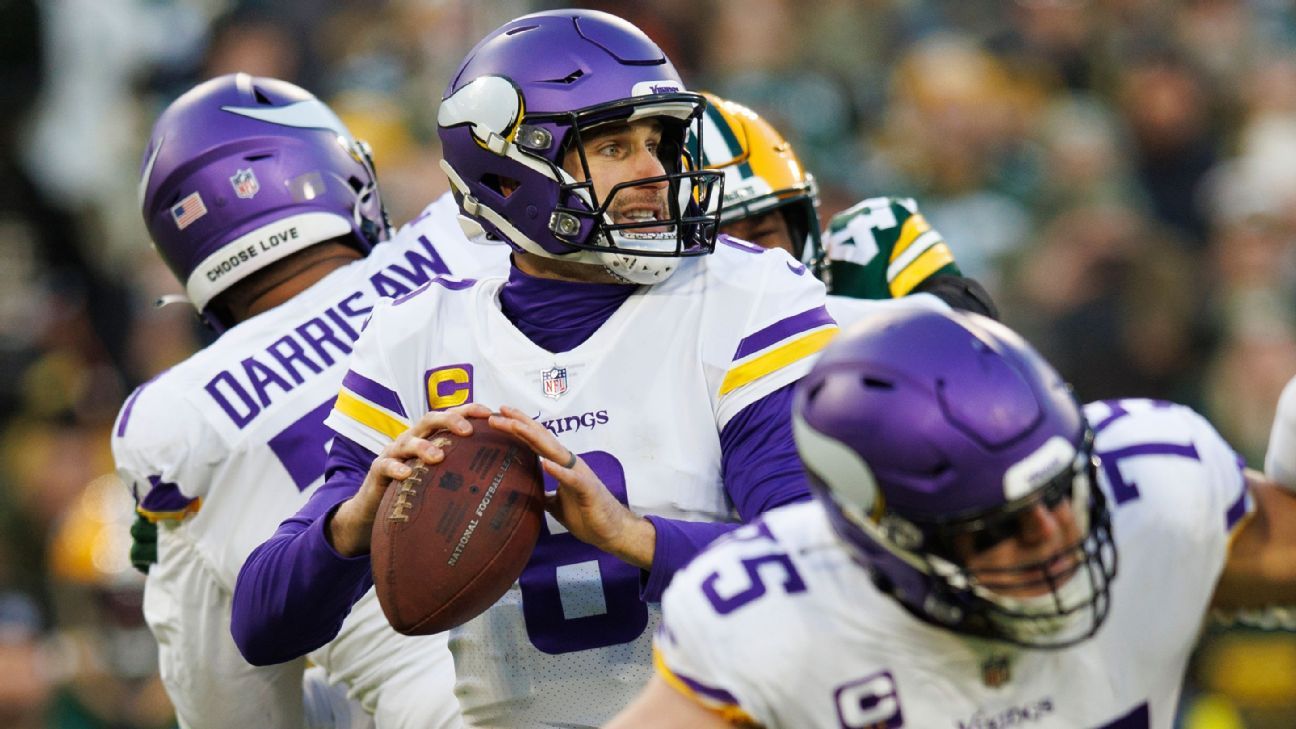EAGAN, Minn. — A season-long debate about the Minnesota Vikings is nearing an end, and here’s the best we can say: They have produced a season unlike any other in modern NFL history.
Their performance has shocked analysts who track metrics that usually reflect reliable outcomes, and it has left supporters to invoke an aphorism attributed to Hall of Fame coach Bill Parcells: “You are what your record says you are.” Teams that fit the Vikings’ performance profile have typically finished their seasons with records around .500, and they have never — not a single time — gone 12-4 through 16 games and been poised to host at least one home playoff game.
“There has never been anything like this,” said Aaron Schatz, editor-in-chief of the analytics site Football Outsiders. “That’s the short version.”
The 2022 Vikings are the biggest overperformers in the 42-year span of data maintained by Football Outsiders, based on the discrepancy between their record and their team DVOA (defense-adjusted value over average), a metric that compares success on each play to the league average based on down and distance with adjustments for situations and opponents. A team with their point and yardage totals on offense and defense, Schatz said, would typically project at about 7.5 wins at this point.
The Vikings’ DVOA ranks No. 28 in the NFL this season, and it isn’t the only model that puts them in the bottom half of the league. ESPN’s Football Power Index (FPI), which incorporates expected points added (EPA), ranks them as the 20th-best team in football.
Why? Put simply, the Vikings have been outscored and outgained this season at a rate never before seen by a team close to their record.
They are the only team ever to achieve a 12-4 record with a negative point differential (minus-19). The next-closest team was the 2016 Oakland Raiders, who outscored their opponents by a total of 31 points.
It’s easy to understand how that point differential has evolved. The Vikings have won an NFL-record 11 games by one score, but as Minnesota wide receiver Justin Jefferson memorably said after Sunday’s 41-17 loss to the Green Bay Packers, “When we lose, we lose bad.” Their four defeats have come by an average of 22.3 points, and were it not for two garbage time touchdowns on Sunday, the Vikings would have become the second team in the Super Bowl era to win 12 games while losing two by at least 30 points.
For context, consider that 15 teams this season alone have a better point differential than the Vikings. All of the teams below them have an 8-8 record or worse.
Points alone don’t tell the story, however. The Vikings have been outgained by an average of 42.9 yards per game this season, and their minus-686 yard differential this season ranks No. 27 in the NFL. The five teams below them average 4.6 wins.
This is not to say, of course, that the Vikings have done nothing to earn their wins. In fourth quarters, they lead the league in offensive scoring (10.1 points) and rank second in turnover margin (plus-8). In other words, they’ve saved their best efforts for the most important part of their games. And they’ve avoided allowing one loss to spill into another, having followed up all three previous defeats this season with a victory.
“I take a lot of pride in what we’ve attempted to build here,” coach Kevin O’Connell said, “and feel pretty strongly about our team and our resiliency.”
Such analysis isn’t meant to discredit the Vikings’ achievements but instead to understand the implications for their chances to win the Super Bowl. Historically, the Vikings’ unique winning formula has not been sustainable. As stated before, the Vikings have won all 11 of their one-score games. Since the 1970 NFL merger, the range of winning percentages in one-score games among the NFL’s 32 teams is .407 to .570.
If the Vikings finish the season with close to the current DVOA rating, Football Outsiders would consider them the NFL’s seventh-worst playoff team since 1981.
“Nobody is trying to go back and take wins away from the Vikings,” Schatz said. “What we’re trying to do is predict the future and marvel at how bonkers this has all been.”
Vikings coaches and players expressed confidence that their close-game victories have left them battle-tested for the postseason, during which games are traditionally a bit closer than their corresponding regular seasons. But scoring and yardage differential, among other metrics, are more predictive of future outcomes than victories in one-score games.
This is not to say that teams that have thrived on one-score wins have never achieved playoff success, and here’s an example to end this on a less dire note.
The 2003 Carolina Panthers were better than the 2022 Vikings in point differential (No. 16) and yardage differential (No. 11). But Carolina did win an NFL-high nine one-score games. Place-kicker John Kasay connected on the same number of game-winning field goals (five) as current Vikings kicker Greg Joseph has in 2022.
The Panthers clinched the NFC South, won three playoff games and advanced to Super Bowl XXXVIII, losing to the New England Patriots — by one score — on a field goal with four seconds remaining.
